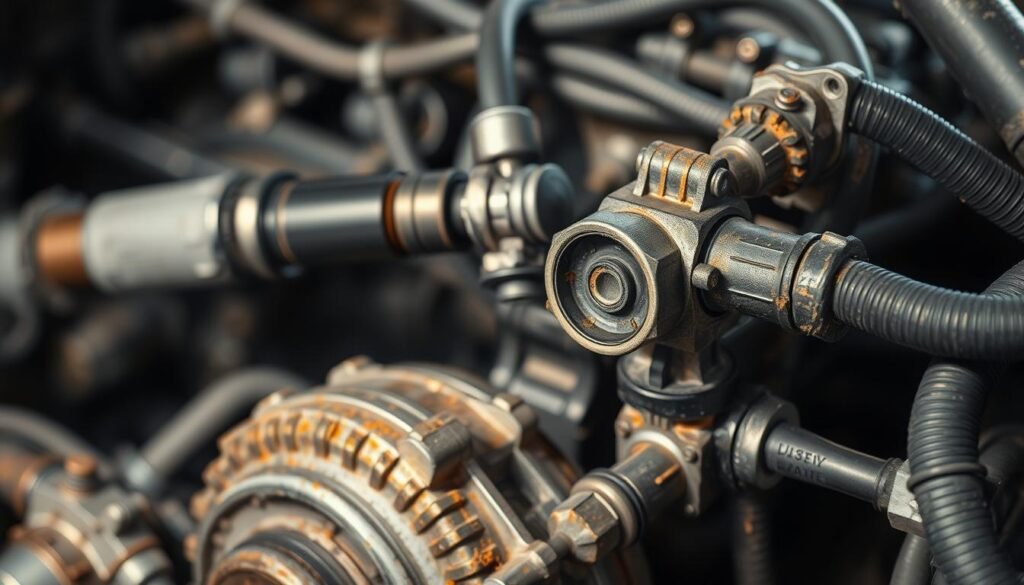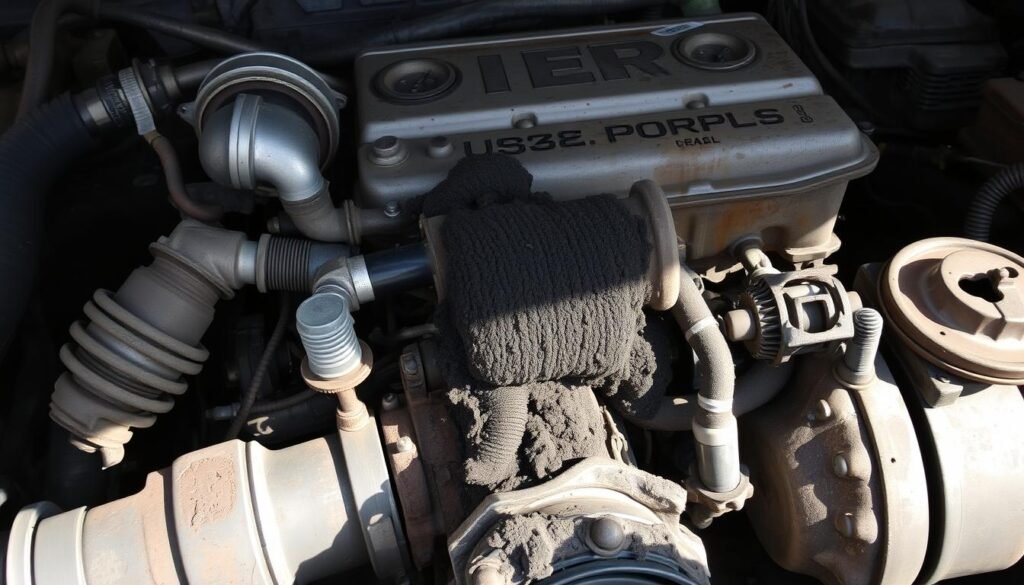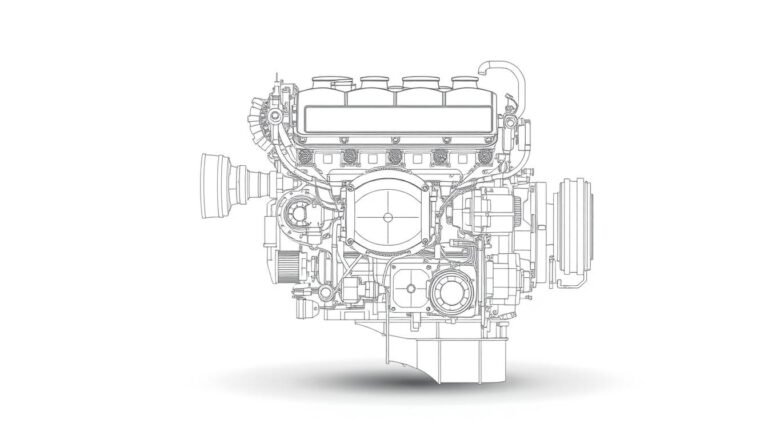Ford 6.4 Diesel Problems – Common Issues Guide
Ford 6.4 diesel problems can be tough for truck owners, like those with the Ford 6.4 Powerstroke engine from 2007.
This engine is loved by many for its power, but it’s important to know about common issues.
This guide will cover fuel system failures, EGR problems, DPF issues, and oil dilution. Knowing about these problems is the first step to fixing them.
You’ll learn how to spot symptoms early. We’ll also show you how to diagnose and fix these issues. Our aim is to help you keep your Ford 6.4 diesel engine in top shape.
Introduction To The Ford 6.4 Powerstroke Engine
The Ford 6.4 Powerstroke was made to fix the issues of the 6.0 Powerstroke. It was introduced in Ford’s Super Duty F-Series trucks.
This engine has a 390.5 cubic inch V8 setup, blending efficiency with power. It stands out because of its sequential variable geometry turbos.
These help it handle air intake better under different conditions. In the introduction to the Ford 6.4 engine, the focus is on performance.
It can make up to 350 horsepower and 650 ft-lbs of torque. This made it popular among owners and car fans.
But, as emissions rules got stricter, problems started for owners. The next parts will look into these issues and how they affect owning this engine.
Overview of Ford 6.4 Diesel Problems
The Ford 6.4 diesel engine is known for its strong performance. Yet, it faces many common issues that can affect its reliability.
These problems include fuel system failures, issues with exhaust gas recirculation systems, and problems with diesel particulate filters.
Users often report extensive oil dilution. This not only hurts engine performance but also leads to expensive repairs.
Common problems with ford 6.4 diesel engines often come from the high-pressure fuel pump and fuel injector failures.
These issues can cause the engine to perform poorly and put extra strain on its parts.
Knowing about these common issues helps you take care of your vehicle better, making it last longer.
What is Common Issues with Ford 6.4 Diesel?
The Ford 6.4 diesel engine has many challenges due to its complex design. It faces high operational demands.
Knowing about ford 6.4 diesel issues helps in maintaining and fixing your vehicle. The fuel delivery system, including the high-pressure fuel pump and fuel injectors, is a major concern.
Common problems with ford 6.4 diesel engines show up in performance issues. Symptoms like hard starts, reduced power, or stalling are common.
Spotting these signs early helps fix problems before they get worse. The engine’s emissions systems, like the Diesel Particulate Filter (DPF) and Exhaust Gas Recirculation (EGR), need regular care.
These systems are key for meeting emissions rules but can wear out the engine if not maintained. Knowing about these systems helps keep your Ford 6.4 running well.
Fuel System Failures in The Ford 6.4 Diesel
The fuel system in the Ford 6.4 diesel is key to the engine’s performance and efficiency. Knowing about common problems can help avoid big repairs and make driving better.
Issues like high-pressure fuel pump and fuel injector failures are common. Spotting these problems early can save you money and time.
High Pressure Fuel Pump Issues
High-pressure fuel pump failures are a big problem in the Ford 6.4 diesel. This part pumps fuel at high pressure for better combustion.
If it breaks down, you might see less engine power, hard starts, and rough idling. Regular checks and maintenance can catch problems before they get worse.
Fuel Injector Failures
Fuel injector failures are also common in the Ford 6.4 diesel. These injectors break down fuel into tiny droplets for efficient burning.
If they fail, you might notice bad fuel efficiency, lots of smoke, or engine misfires.
Keeping the fuel system clean and changing fuel filters on time can help prevent these failures.
| Issue | Symptoms | Maintenance Recommendations |
|---|---|---|
| High Pressure Fuel Pump Failure | Diminished engine power, difficulty starting, rough idling | Regular inspections, timely replacements |
| Fuel Injector Failure | Poor fuel efficiency, excessive smoke, misfiring | Fuel filter changes, system cleaning |

Exhaust Gas Recirculation (EGR) Problems
The EGR system is key in the Ford 6.4 diesel engine. It manages emissions by sending exhaust gases back into the intake.
This action cuts down on nitrogen oxide emissions but can cause problems if not watched closely.
Knowing about EGR issues in Ford 6.4 diesel engines is important for keeping the engine running well.
Coolant Cavitation in The EGR System
Coolant cavitation in the EGR system is a big worry. It happens when coolant faces quick pressure changes, creating vapor bubbles.
These bubbles then collapse, damaging engine parts. This can make the engine overheat and lower coolant efficiency.
Regular checks on the EGR system can spot these problems early. This helps avoid bigger issues later on.
Impact of EGR on Engine Performance
Problems with the EGR system can really hurt engine performance. If the EGR system doesn’t work right, exhaust gases aren’t recirculated well.
This leads to more emissions and less fuel efficiency. It’s important to keep an eye on how EGR affects engine performance.
Knowing about these issues helps car owners fix problems early. This can make the engine last longer.
Diesel Particulate Filter (DPF) Complications
The DPF system is key for meeting emissions standards, like in Ford 6.4 diesel engines. But, it faces several issues.
Clogging is a big problem, hurting engine performance. A clogged DPF raises exhaust back pressure. This makes the engine work harder and use more fuel.
Ignoring this can lead to costly regeneration cycles. Short trips often cause clogging because the engine doesn’t get hot enough for regeneration.
Watching your driving habits is important. Long drives help keep the DPF clean by allowing it to regenerate.
Knowing these issues helps you take steps to keep your Ford 6.4 diesel running well.

Oil Dilution and Its Consequences
Oil dilution is a big problem for Ford 6.4 diesel engine owners. It happens when fuel leaks through the diesel particulate filter (DPF) and exhaust gas recirculation (EGR) systems.
This can make the engine oil dirty, leading to serious issues.
Impact on Rocker Arms and Valve Train
Oil dilution affects more than just your car’s performance. It can harm the rocker arms and valve train, which need good oil to work right. Without it, they wear out faster and might break.
Signs of oil dilution include:
- Ticking or knocking noises from the engine
- Decreased engine performance
- Oil level fluctuations
To fight oil dilution in Ford 6.4 diesel engines, change the oil regularly. Use high-quality oil to keep your engine running smoothly.
This helps prevent dilution and keeps your engine parts in good shape.
Common Signs of Ford 6.4 Diesel Engine Problems
Spotting early signs of ford 6.4 diesel engine troubles is key to avoiding major damage. Keep an eye out for symptoms that pop up while driving.
A constant ticking sound from the diesel engine might mean there’s a fuel system problem. Also, if your engine is using more oil than usual, it’s a red flag.
This could mean the oil is getting diluted or there’s another engine issue. White smoke coming from the exhaust is another warning sign.
It often points to fuel injection or combustion problems. If your engine starts acting up, like stalling or hard to start, it’s a sign of deeper issues.
Don’t ignore the dashboard lights. They’re there to warn you about engine problems. Ignoring them can lead to bigger issues later on.

Troubleshooting Ford 6.4 Diesel Issues
Fixing ford 6.4 diesel problems needs a careful and detailed plan. First, do a thorough visual check for leaks, damage, or wear.
These early checks often spot problems that need quick fixing. Then, check the levels of important fluids like oil, coolant, and fuel.
Keeping these levels right is key for your engine’s health and life. Low levels can mean leaks or other issues that need fixing.
Diagnostic tools are key in finding ford 6.4 diesel problems. They read error codes from the engine control module.
This helps pinpoint issues like faulty fuel injectors, EGR problems, and DPF issues.
Being proactive in fixing problems early helps avoid more damage. It also makes your Ford 6.4 Powerstroke engine last longer.
| Step | Action | Purpose |
|---|---|---|
| 1 | Conduct visual inspections | Identify leaks or physical damage |
| 2 | Check fluid levels | Ensure adequate oil, coolant, and fuel |
| 3 | Use diagnostic tools | Read and analyze error codes |
| 4 | Investigate identified issues | Formulate a plan for repair or maintenance |
How To Fix Ford 6.4 Diesel Issues?
Fixing common Ford 6.4 diesel problems starts with knowing what issues you face. For example, fixing fuel system failures often means replacing faulty fuel injectors or high-pressure fuel pumps.
These parts are key to the engine’s performance and efficiency. Dealing with EGR system problems might require more complex repairs.
Coolant cavitation can also harm performance, so replacing parts might be needed. Regular checks and maintenance help figure out how big these problems are.
It’s wise to get help from certified mechanics who know diesel engines well. They can give you the right advice and fix your Ford 6.4 diesel engine properly.
Knowing your options helps you make the best choices for repairs.

| Common Issue | Repair Type | Description |
|---|---|---|
| Fuel Injector Failure | Replacement | Installing new fuel injectors to ensure optimal fuel delivery. |
| High Pressure Fuel Pump Issues | Repair/Replacement | Fixing or replacing the high-pressure fuel pump for adequate fuel supply. |
| EGR System Problems | Component Replacement | Replacing damaged components to reduce cavitation and improve engine performance. |
| DPF Complications | Cleaning/Replacements | Cleansing or replacing the Diesel Particulate Filter to enhance exhaust flow. |
Preventive Maintenance Tips For The Ford 6.4 Powerstroke
Regular maintenance for your Ford 6.4 diesel engine can prevent many problems. It’s important to change the oil and filters on time.
Always follow the schedule set by the manufacturer to keep everything running right. Using top-notch fuel filters is key to a healthy fuel system.
Regular checks on the EGR system and fuel pump can spot issues early. Keeping up with maintenance helps your Ford 6.4 Powerstroke perform well and last longer.
- Change engine oil and filter every 5,000 to 7,500 miles.
- Inspect and replace the fuel filter as needed.
- Check EGR system functionality regularly.
- Keep an eye on coolant levels to avoid cavitation issues.
- Test the fuel pump to ensure proper operation.
Following these maintenance tips for your Ford 6.4 Powerstroke ensures a reliable and efficient vehicle.
Don’t skip scheduled maintenance and inspections to avoid expensive repairs later.
Conclusion
The Ford 6.4 diesel engine is powerful but comes with common problems. Knowing about fuel system issues, EGR problems, and oil management is key.
These areas need your focus to avoid and fix problems. Being aware of signs and symptoms helps you act early.
A good maintenance plan can prevent fuel pump failures and other issues. This keeps your engine running well and your driving experience better.
Learning about your Ford 6.4 diesel engine is a smart move. It helps you make smart choices and keeps your vehicle in top shape.
This guide helps you manage and maintain your engine’s performance.
FAQs
Q: What are the most common Ford 6.4 diesel problems?
A: Common issues include fuel system failures, EGR problems, DPF complications, and oil dilution. These problems can lead to poor engine performance and costly repairs.
Q: How can I troubleshoot my Ford 6.4 diesel engine?
A: Start by looking for leaks and checking fluid levels. Use diagnostic tools to find error codes related to fuel injectors, EGR faults, and DPF performance. Early detection can prevent further damage.
Q: How do I fix fuel system failures in the Ford 6.4 diesel?
A: Fixes may involve replacing faulty fuel injectors or high-pressure fuel pumps. Regular maintenance like changing fuel filters can help prevent these problems from worsening.
Q: What should I monitor with the EGR system?
A: Keep an eye on coolant levels and check for signs of overheating or coolant loss. These may indicate cavitation issues that can affect engine performance.
Q: How can I address DPF complications?
A: Prevent DPF issues by monitoring driving habits. Avoid frequent short trips that can lead to clogging. If clogging occurs, consider cleaning or replacing the DPF as needed.
Q: What are the symptoms of oil dilution in a Ford 6.4 diesel?
A: Symptoms include unusual ticking noises, increased oil consumption, and a decrease in engine performance. Regular oil changes with quality lubricants can help manage this issue.
Q: How often should I perform maintenance on my Ford 6.4 diesel?
A: Follow manufacturer service intervals for oil and filter changes. Regularly inspect critical components, like the EGR system and fuel pump, to keep your engine in good condition.







